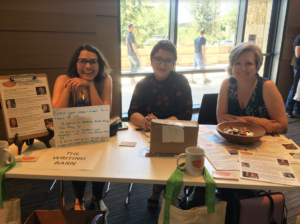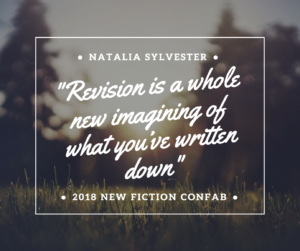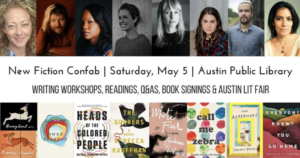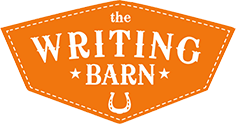by Sydney Chandler, WB Intern
If you haven’t made it out to the new Austin Central Library, I highly recommend you do so. The library is, in my opinion, the perfect creative haven. If you need a place to write, or study, or simply sit and look out at this city we call home, the Austin Central Library is the place to do so. (An abundance of trees and lounge chairs on the roof? Count me in!)
 This past Saturday, I joined The Writing Barn team in the library’s event room for the 2018 New Fiction Confab. We set up an information table – with an abundance of chocolate on top – and listened in as the New Fiction Confab authors talked process, execution, and inspiration.
This past Saturday, I joined The Writing Barn team in the library’s event room for the 2018 New Fiction Confab. We set up an information table – with an abundance of chocolate on top – and listened in as the New Fiction Confab authors talked process, execution, and inspiration.
One of the topics looked at deeply in the first panel was revision. Revision, for me, is a daunting and overwhelming process. I get caught up in editing and creating at the same time – writing and revising all at once. This inevitably leads me to dissecting the first three chapters of a story until all that is left is a paragraph or two – a few lines that I am undoubtedly extremely proud of – but lines that have taken me away from the story and the freedom of un-edited creativity.
If you’re like me, then it might help to hear what Natalia Sylvester, author of Everyone Knows You Go Home, and Owen Egerton, author of Hollow, had to say on the creating and revising process. They both advocated for writing your first draft all the way through without criticizing the words you put down. Owen talked about simply “writing to the end,” and allowing yourself to write down as many awful metaphors and ridiculous descriptions as your creative mind deems necessary. The first word you put down is the right word – in short: just keep writing like no one will ever read it.
 Natalia described revision as the place where “things begin to make sense … revision is a whole new imagining of what you’ve written down.” Only once you’ve allowed your creativity to fill up the first draft can you truly begin to consider what the story at hand is trying to say. Owen looked at revision as “a chore, but also a freedom.” It is the space where the author can “play; mess up; experiment” – from my understanding, both authors looked at the first draft as a spilling out of imagination, and the revision process as a lengthy conversation with the content.
Natalia described revision as the place where “things begin to make sense … revision is a whole new imagining of what you’ve written down.” Only once you’ve allowed your creativity to fill up the first draft can you truly begin to consider what the story at hand is trying to say. Owen looked at revision as “a chore, but also a freedom.” It is the space where the author can “play; mess up; experiment” – from my understanding, both authors looked at the first draft as a spilling out of imagination, and the revision process as a lengthy conversation with the content.
Another topic brought up in panel was inspiration. Thomas Pierce, author of The Afterlives, had an interesting viewpoint on how to find inspiration. For Thomas, creation is “taking something that is somewhat familiar and rendering it unusual.” In marrying the mundane with the strange and fantastical, one can find both inspiration and imagination. Owen Egerton, whose book Hollow is influenced both by the Book of Job and the Hollow Earth Theory, said that he finds inspiration by asking himself: “What are my greatest fears? My wants? My shame?”

We all have our own ways of finding inspiration for our art – my stories usually come to me in dreams, or during the process of attempting to make sense of a dream. It seems to me that all three authors on panel found inspiration by looking at something that interested them, whether that interest be fearful, loving, or simply inquisitive. Natalia Sylvester found interest in the ideas of borders, ancestry, and honor. Thomas Pierce found interest in the ideas of death, time (as an illusion), and pseudoscience. Owen Egerton found interest in humanity’s unwavering ability to believe.
What I gained from this year’s New Fiction Confab is this: Wherever your interests lie – pursue them. When pursuing your interests, allow your creativity to take the reins. And when you are ready to start conversing with your creativity, it is time for the revision process to begin.
